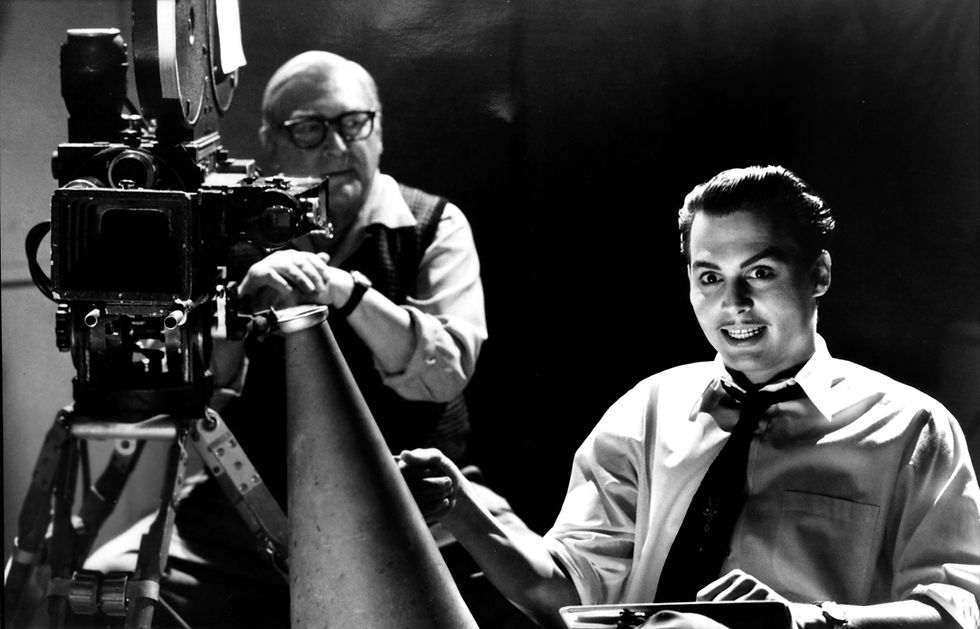Ed Wood (1994)
- Soames Inscker

- Jul 21, 2025
- 3 min read

Tim Burton’s Ed Wood is a beautifully strange and unexpectedly poignant black-and-white biopic that tells the story of Edward D. Wood Jr., the eccentric filmmaker often labelled “the worst director of all time.” Far from mocking its subject, Burton’s film is a tender, lovingly crafted tribute to artistic passion, no matter how misdirected it might be.
Anchored by Johnny Depp’s energetic performance and Martin Landau’s Oscar-winning portrayal of Bela Lugosi, Ed Wood is both a celebration of outsider creativity and a moving meditation on friendship, perseverance, and delusion.
Plot Summary
Set in 1950s Hollywood, Ed Wood follows the rise (and fall) of Edward D. Wood Jr., a cross-dressing, ever-enthusiastic director with big dreams but little talent. Inspired by the likes of Orson Welles and driven by an unshakable belief in himself, Ed is convinced he’s making great cinema—despite shoestring budgets, laughable scripts, and wooden performances.

The film traces Wood’s chaotic filmmaking journey, from Glen or Glenda (1953), a semi-autobiographical passion project, to his infamous cult classic Plan 9 from Outer Space (1959). Along the way, he befriends aging horror icon Bela Lugosi (Martin Landau), who becomes both muse and tragic companion. Their bond is the emotional spine of the film, as Ed’s misguided optimism contrasts sharply with Lugosi’s fading fame and addiction.
Performance Highlights
Johnny Depp plays Ed Wood with boundless optimism and manic charm. His portrayal eschews caricature, instead presenting Ed as a true believer, someone so infatuated with cinema that failure becomes irrelevant. Depp finds the heart in Wood’s obliviousness, giving the character genuine warmth and integrity.
Martin Landau delivers a tour de force as Bela Lugosi. He transforms the aging icon into a layered, tragic figure—at once proud, bitter, and deeply lonely. His performance is full of subtlety and pain, and his embodiment of Lugosi’s thick Hungarian accent and declining health earned him a richly deserved Academy Award for Best Supporting Actor.
Sarah Jessica Parker plays Dolores Fuller, Wood’s long-suffering girlfriend, while Patricia Arquette appears later as his more understanding partner, Kathy. Supporting turns from Bill Murray (as flamboyant friend Bunny Breckinridge) and Jeffrey Jones (as psychic TV host Criswell) add comic sparkle.
Direction and Style
Tim Burton, known for his love of misfits and outsiders, was the perfect director for this story. But Ed Wood stands apart from his more fantastical fare. Though stylised, it’s one of his most grounded and emotionally sincere films. He avoids mocking his subject, choosing instead to highlight the joy and tragedy of creation against all odds.
The decision to shoot in black and white is not just aesthetic—it immerses the viewer in 1950s Hollywood, echoing the look and feel of Wood’s own films. Cinematographer Stefan Czapsky’s lighting evokes the era’s pulpy horror tones while giving the film a timeless visual elegance.
Themes
At its core, Ed Wood is a film about passion in the face of mediocrity. It asks: is it better to try and fail than never to try at all? Ed is clearly not a great filmmaker, but his enthusiasm and commitment are infectious. Burton explores the line between ambition and delusion with empathy, never sneering at Wood’s shortcomings.

The film also tackles aging and obsolescence through Bela Lugosi’s tragic arc. Once a cinematic titan, Lugosi is now addicted to morphine, broke, and forgotten. His relationship with Ed is touching—equal parts exploitation and genuine friendship—and gives the film a bittersweet emotional weight.
Production Design and Score
The production design by Tom Duffield captures the scrappy energy of mid-century B-movie sets—cardboard gravestones, flying saucers on strings, and haphazardly built sound stages. It’s a lovingly detailed recreation of low-budget filmmaking’s charming absurdity.
Danny Elfman’s score is more subdued than his usual Gothic bombast, mixing whimsical flourishes with melancholy undertones that match the film’s tonal blend of comedy and pathos.
Critical Reception and Legacy
Ed Wood was a critical triumph, though it underperformed at the box office. Critics praised its heart, craftsmanship, and performances, especially Landau’s. The film won two Academy Awards: Best Supporting Actor for Landau and Best Makeup for Rick Baker’s remarkable transformation of Landau into Lugosi.
Over time, Ed Wood has gained recognition as one of Tim Burton’s finest films—possibly his most personal and human work. It speaks to anyone who’s ever dreamed big and failed gloriously, celebrating the beauty of trying.
Conclusion
Ed Wood is a quirky, touching, and ultimately life-affirming film that finds poetry in failure. By reframing Ed Wood not as a joke but as a symbol of relentless creative spirit, Tim Burton gives us a biopic that is funny, strange, and deeply moving. It's a film about making bad movies—and about how even bad art can be made with love.
Rating:
An affectionate portrait of a dreamer, anchored by masterful performances and Burton’s most heartfelt direction. A cult classic in every sense.



